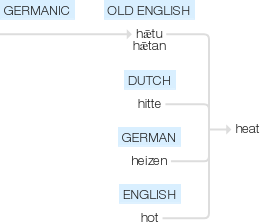Heat
Old English hǣtu (noun), hǣtan (verb), of Germanic origin; related to Dutch hitte (noun) and German heizen (verb), also to hot.
wiktionary
From Middle English hete, from Old English hǣte, hǣtu(“heat, warmth; fervor, ardor”), from Proto-Germanic *haitį̄(“heat”), from Proto-Indo-European *kayd-, a derived form of *kay-(“heat; hot”).
Cognate with Scots hete(“heat”), North Frisian hiet(“heat”), Old High German heizī(“heat”). Related also to Dutch hitte(“heat”), German Hitze(“heat”), Swedish hetta(“heat”), Icelandic hiti(“heat”).
From Middle English heten, from Old English hǣtan(“to heat; become hot”), from Proto-Germanic *haitijaną(“to heat, make hot”).
etymonline
heat (n.)
Old English hætu, hæto "heat, warmth, quality of being hot; fervor, ardor," from Proto-Germanic *haita- "heat" (source also of Old Saxon hittia, Old Norse hiti, Old Frisian hete, German hitze "heat," Gothic heito "fever"), from the same source as Old English hat "hot" and hæða "hot weather" (see hot).
Meaning "a single course in a race," especially a horse race, is from 1660s, perhaps from earlier figurative sense of "violent action; a single intense effort" (late 14c.), or the meaning "run given to a horse to prepare for a race" (1570s). The latter word over time was extended to "division of a race or contest when there are too many contestants to run at once," the winners of each heat then competing in a final race.
Meaning "sexual excitement in animals" is from 1768, especially of females, corresponding to rut in males. Meaning "trouble with the police" attested by 1920. Heat wave "period of excessive hot weather" first attested 1890; earlier in reference to solar cycles. Heat-stroke is from 1858. Heat-seeking (adj.) of missiles, etc., is by 1955. Red heat', 'white heat are in reference to the color of heated metals, especially iron.
heat (v.)
Old English hætan "to make hot; to become hot," from Proto-Germanic *haita- (see heat (n.)). Related: Heated (with many variants in Middle English); heating. Bartlett ("Dictionary of Americanisms," 1848) reports that het, as past tense and past participle of heat, is "Often heard in the mouths of illiterate people." Compare Middle Dutch heeten, Dutch heten, German heizen "to heat."
